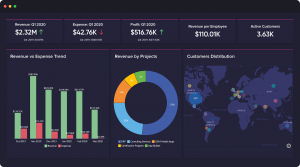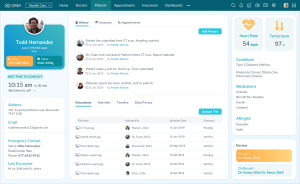Business owners can gain intelligent insights into their operation by using new AI-equipped data tools – even if they don’t have data science and analysis expertise.
Software tools and cloud-based services with artificial intelligence (AI) give business owners without an analytical background (or a huge, highly trained IT team) the ability to gain actionable customer relationship insights from data review. Companies in marketing, sales, human resources, finance, and other sectors can all benefit directly from data-driven competitive analysis, without a sophisticated in-house technical infrastructure.
The analysis comes from using what’s called self-service business intelligence (SSBI). It’s a growing field supported by software makers both large and small. In fact, the SSBI market will grow at an annual rate of 15 per cent or more over the next five years, according to recent forecasts by ResearchandMarkets.com.

New software tools and cloud-based services give business owners without an analytical background (or a huge, highly trained IT team) the ability to gain actionable customer relationship insights from data review. Zoho images used.
Companies in the SSBI market include majors like Google Cloud Dataprep, IBM/Cognos Watson Studio, and Microsoft Power BI, with strong competition from a multitude of other development companies from A to Z: Altair Monarch, Domo, Tableau, and Zoho, among others.
Many of the SSBI platforms that have customer data and relationship management capabilities are more and more integrating artificial intelligence and machine learning, providing functionality that includes real-time decision-making, predictive analysis, and conversation assistants (or chatbots) that can engage customers and inform sales teams.
As one example, the case of Zoho Corporation, a global technology company based in India (with representation here in Canada): it has added a conversational AI tool called Ask Zia to its existing Zoho Analytics platform. It lets business users ask questions about data using natural language queries. Not only can it provide a text-based narration of garnered insights from various reports and dashboards, Zia includes a “what-if” capability for analyzing different “scenarios” and decision-making options.
Zia makes using Zoho’s BI platform for data preparation and analysis in service of business intelligence that much easier, says Canadian-based Zoho evangelist, Chandrashekar (LSP).

Self-service business intelligence tools make it possible to capture actionable data insights to boost a company’s operational efficiency and productivity.
“Zoho Analytics provides out-of-the-box plug-and-play compatibility with more than 250 data sources, like Salesforce, Xero, Shopify, Hubspot, AWS” and more, he describes, so users can create pre-built reports and dashboards powered by AI/ML capabilities. Users can also export data to cloud storage solutions, cloud databases, and warehouses, or as program files in various formats.
Other data preparation tools can be used to clean, transform, and enrich data by removing duplicates and finding invalid entries, he adds, with machine learning capabilities to perform keywords extraction, language detection, and other natural language processes such as sentiment analysis.
But even with the sophisticated data analysis capabilities brought about through the use of self-service business intelligence tools, business owners still have to “tell the story”.
(You may have seen that Lego-like building block ad that shows multi-coloured plastic blocks randomly spread on a table. That’s raw data. Then the blocks are shown arranged in groups, by colour. That data’s been sorted. But the next frame shows a house, built using the blocks. That’s the story that data can tell!)
So Zoho has added Data Story to its SSBI suite, a tool that blends presentation software with analytical insights. Data Story lets customers add creative elements to their presentations, like text, infographics, videos, and shapes to create a compelling analytical narrative.

Businesspeople can create their own interfaces and presentation graphics, suited to the role of each employee, without IT or developer involvement.
Canvas for Zoho CRM is a similar tool, a kind of design studio for CRM personalization. Businesspeople can create their own CRM interfaces, suited to the role of each employee, without IT or developer involvement.
End-to-end SSBI platforms like that from Zoho enables business owners and operators to develop a more competitive business strategy based on real-time insights gleaned from data they themselves can analyze and present. Self-service and real-time capabilities make it possible to capture actionable data insights to boost operational efficiency and productivity.
-30-



